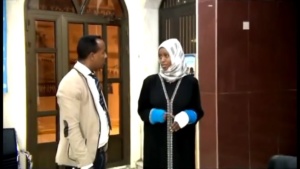An Ethiopian maid who was forcibly thrown from the seventh floor of a building in Kuwait has returned to the country four months after the incident that sparked outrage in the Gulf country and abroad.

The Addis Standard news portal shared photos of Adesech Sadik after her arrival in Ethiopia. She had previously been receiving medical treatment in Kuwait.
She made international headlines when her employer ostensibly filmed a video of Adesech holding on to a window frame with one hand and subsequently falling on a metal canopy seven floors below.
“I wasn’t trying to commit suicide, I was trying to escape from the woman who tried to kill me.”
Local media reported that her employer was arrested for not helping Adesech who was rescued by health professionals and rushed to the hospital with blood oozing from her nose and ears as well as a broken arm.
The incident happened in the Sabah el-Salem area, and was widely condemned after the recording of about 18 seconds went viral on social media with rights groups calling for a probe into the incident and possible prosecution.
Her employer had explained that the maid was trying to commit suicide, a claim the injured victim rejected in an interview. “I wasn’t trying to commit suicide, I was trying to escape from the woman who tried to kill me,” she said in a video shared by Ethiopian media in April.
Most rich Middle East countries hire thousands of domestic helpers from Africa and Asia. Most of these women often complain of abuse from their employers. Recently Saudi Arabia ordered unregistered migrants ‘amnesty’ to return home voluntarily or be arrested and forcibly thrown out.
Ethiopia was one of the most affected countries. Despite two amnesty extensions granted by the Gulf State, the Ethiopian government said it did not get the desired response by way of returnees. The state carrier, Ethiopian, was roped in to help with flying back migrants.
Kindly follow us on twitter:@AfricanVoice2










How awful for this lady it’s unfortunate that this is the plight of people who leave their families behind to make a living. They probably work for minimum wage and have a poor quality of life. There ought to be more done in the area of law to protect these people’s human rights.
Comments are closed.